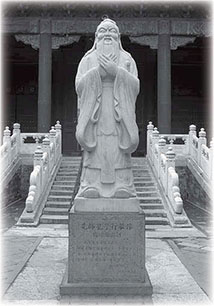
David E. Scharff
ANALYTIC FORAYS IN CHINA
Analytic Forays in China
David E. Scharff
David E. Scharff, M.D., is co-founder and chair of the Board of the International Psychotherapy Institute, Washington, DC, a faculty member of the Washington Baltimore Center for Psychoanalysis, and director, the Beijing Program in Couple and Family Psychoanalytic Psychotherapy.

David E. Scharff
I have been travelling to China for 10 years, at first in response to invitations from Wuhan’s unique Hospital for Psychotherapy; to Shanghai and Hong Kong to teach; and since 2010, as part of a course I direct and offer with colleagues, organized by Fang Xin of the Peking University Psychology Counseling Center.
This course meets for six days twice each year, in September and March, and teaches basics and advanced topics in psychoanalytic couple and family therapy. We have two small groups a day run by our more experienced students, whom we have trained in running groups that help students digest both didactic material and clinical experience. As I write this we are about to begin our fifth rendition of this two-year program. My experience with approximately 400 students is augmented by clinical interviews I conduct there, and by the opportunity for twice monthly group supervision with some of the more experienced clinicians through distance technology. All of this is done through translation, and it is the problem of translating both the language and the culture I want to discuss here.
From the first time I went to China, I have considered myself a student of the culture. In this regard, our translators are colleagues and teachers, because psychoanalytic and psychotherapeutic concepts always have to be translated indirectly with jerry-rigged Chinese language. It’s not just that the Chinese language is structurally so different from English, although that is certainly true. They don’t use verbal tenses, and the written language is made up of the series of characters that have various combinations, many of which can mean more than one thing, the meaning determined by context. In order to type, our Chinese colleagues have to use “pinyin”—that is, our letters written to sound roughly like their language, and then choose from a menu of a number of characters offered to them on the screen in order to render their meaning more exactly in Chinese. Chinese is structured so one of four inflections of tone determine the meaning of words, which can otherwise be ambiguous, leading to kinds of poetic possibilities that are quite different from those of our language.
…it is the problem of translating both the language and the culture I want to discuss here.

Misunderstanding Built on Ambiguity
The structure of Chinese thought is equally different from ours. Where we— especially we Americans—value clarity of thought and precision of meaning (except perhaps in our psychoanalytic writing in which obscurity and ambiguity seem to be valued), the Chinese value metaphor and indirection. This is often taken as a fault of the Chinese by those of us in the West who value such directness, clarity and faithfulness to our word. For instance, those who have attempted to conduct diplomacy with the Chinese have often come away feeling the Chinese “simply lie.” But what they fail to understand is that it is not politic or polite to say “No!” to somebody directly. Instead the Chinese have evolved over the millennia a way of saying “Yes” in such a way that is clear to everyone involved who understands Chinese culture that they’re really saying “No.”
A college classmate of mine who was vice chair of a major industrial company doing business in China over many years went there often. His last trip occurred when he was on a panel trying to explain Chinese thought to American business colleagues. When he said boldly, “What you have to understand about the Chinese is that they lie,” this statement ensured that would be his last trip to China. Another friend, a lawyer who had made frequent trips to China, apparently was more politic. He managed to keep going to China, but, he noted, “What you have to understand about the Chinese legal system is that while we in the West have ‘the rule of law,’ the Chinese have ‘the law of the ruler.’“
People doing business in China who want to establish themselves there have had to concede that the Chinese will take what we regard as sacrosanct intellectual property and simply appropriate it. Often this is done in the open, with the Chinese demanding they have the right to patents or protected information, and they will then establish the business or manufacture the products on their own. It is up to the American companies to decide whether they want to do business in this environment. Some who have tried to establish themselves there without careful negotiation have been surprised when the Chinese partner for a while, and then once the experience has been shared, say to the Western or American company, “Thank you very much. We can now do this on our own.”—without paying further royalties or licensing fees.
Chinese “piracy” is well known. There are many ways of pirating American movies, starting simply with the Chinese sending people with video cameras into movie screenings, filming the screening of the movie, and then releasing a cheap pirated version. But in these digital days it is much easier to pirate. Western companies have begged China to cooperate in shutting down these operations. The Chinese national government seemed at first to cooperate, only to meet strenuous local opposition. There are areas of China where the entire industry is producing such pirated materials, so when the national government tried to shut them down, local governments complained this would throw hundreds or thousands of people out of work. The national government backed off.
In psychoanalysis, however, we are in a uniquely advantaged position. What we have to offer to China as we work to educate young Chinese clinicians, cannot be patented and cannot be stolen. We are as eager to give it to them as they are to have it. So, we do not face the same conflict about exporting analytic ideas into China as our legal and business compatriots do. It is therefore a privilege to be able to go to China, to be embraced enthusiastically as bringing something of great value, to have the Chinese embrace psychoanalysis because its capacity for deep and unstructured thought fits with their Confucian, Daoist and Buddhist values, and to have them work to learn it, and, at the same time, to make it their own so it can be even more useful.
We face a culture with a different deep structure of thought… thinking has to be metaphorical and indirect in order, paradoxically, to be clear.
What about psychoanalysis in this environment? We face a culture with a different deep structure of thought in two ways. First, Chinese thought is metaphorical. Instead of simply talking about the equality of women, Mao dictated, “Women hold up half the sky.” Everybody knew what he meant. He also constructed a strategy for the Communist Party in which they would insinuate themselves in the population “as a fish swims in water.” Thinking has to be metaphorical and indirect in order, paradoxically, to be clear to a Chinese mentality. This means analytic metaphors are often clearer ways of communicating than directness. In any event, we should be comfortable with this since we value ambiguity of unconscious meaning in the analytic situation and the treatment process.
Individualism and Group Loyalty
Another difference concerns the question of individualism and autonomy. In the West, we highly value autonomy, the striving of each person to become individuated from his and her family. In contrast, the Chinese have a 2500-year history of loyalty to the group. Confucius taught that each person should be subservient to the group, honoring the emperor, the family and the father. Older sons are valued above others, and, in an ideal situation the emperor, father and oldest son reciprocate through loyal caretaking of their domain, family, younger children and especially the women who had very little standing. Mao tried to wipe out loyalty to family and replace it with loyalty to himself and to the Communist Party, but in that way he was ideologically another in a long series of emperors.
In China, marriages had always been arranged more than individually selected, and now the party was in charge of arranging marriage and divorce. People could not get married or divorced without permission from the work group, which meant ultimately from the Communist Party. With the opening up of China after Mao’s death, negotiated marriages and negotiated choices began to diminish in favor of individually determined, often romantically conceived, marriages. But in the mind of the individuals there remains a resurgent conflict between loyalty to the family and to the group, and the need to be entrepreneurial and increasingly individualistic. Thus, the individualism we see in contemporary China is a conflictual one.
Since analysis values autonomy and individuation, that means the very goals we strive for in the West bring a kind of intrinsic cultural conflict to each individual, couple or family we treat in China. Taoism teaches being at one with nature and the natural world, not struggling against it. Buddhist influence teaches patience in the face of adversity. These aspects of the deep structure of thought have come back in a strong, often largely unconscious way. Chinese culture is also more oriented to shame than to guilt. The source of the shame is the loyalty to the group and the “loss of face” that results when somebody disappoints group norms and expectations. What we regard as the territory of depressive guilt—having to do with concern for others, is often dominated instead by group-based “loss of face” because the person believes he or she has let down the group and family.
These things are all manageable in the conduct of psychotherapy and psychoanalysis, but they require a consciousness that alerts us to these conflicts within individuals as they struggle with the rapid evolution of their own culture toward individual autonomy, while inwardly and unconsciously conflicted by loyalty to old values and to their families—at the same time as they are increasingly under pressure to be individually entrepreneurial and out for themselves.
Because of such differences in the structure of thought, which Christopher Bollas has outlined in his fine 2013 monograph, China on the Mind, we have a great deal to learn. Not only do we have the opportunity to increase our understanding about a culture so vastly different from our own, but just being in such an environment calls attitudes into question that we have taken as axiomatic for the entire human race, and which, it turns out, are comparatively specific to our own very Western philosophy and assumptions. China thus offers us an opportunity to stand outside ourselves, to learn from being able to share such a uniquely disparate point of view of the human experience. This is enough to make us feel slowly more comfortable with the Chinese Taoist philosophy of being at one with nature without trying to resist as though we were naturally separate from the larger world. This is among the many edifying possibilities to be gained from traveling to China and working with our Chinese colleagues.
